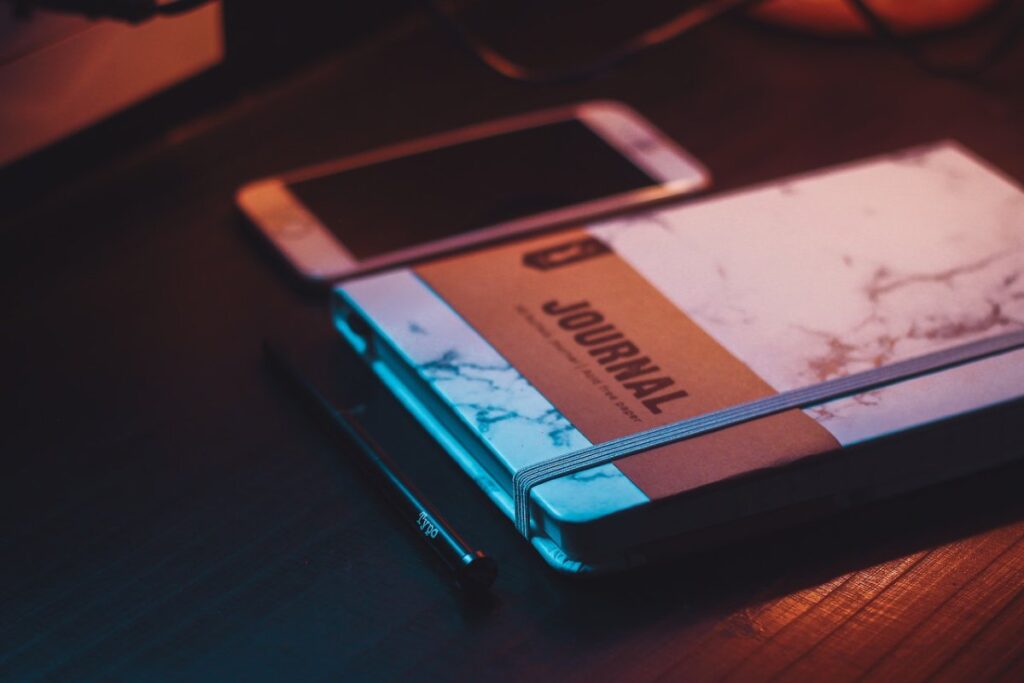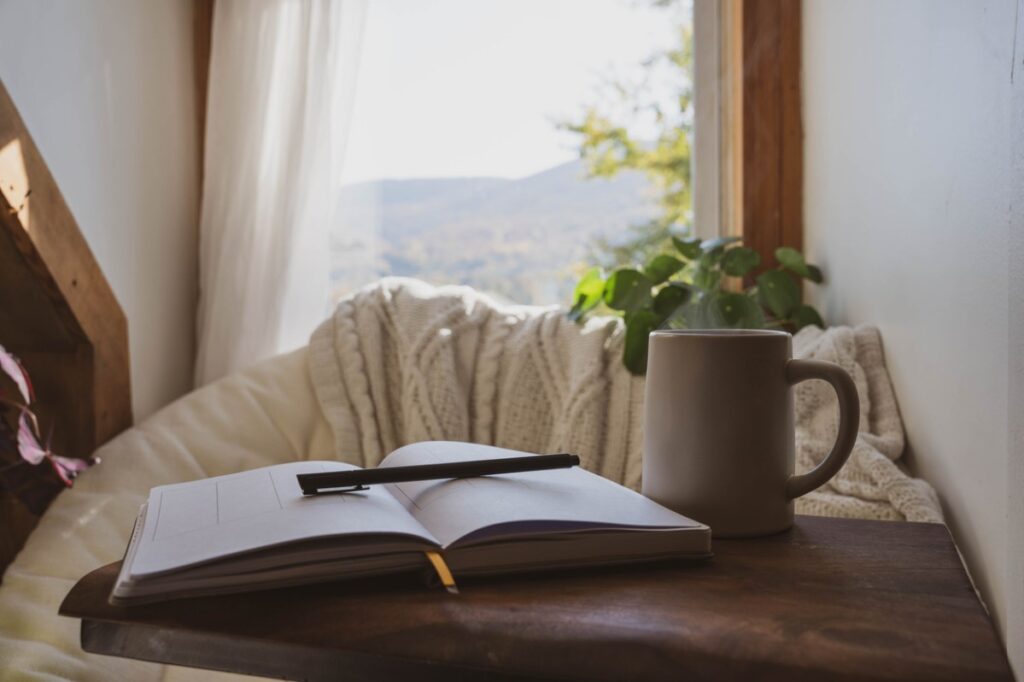If, like millions of Americans you suffer from anxious thoughts and feelings it can be a struggle just getting through the day. Morning and night can be particularly anxious times for people as cortisol levels tend to be highest in the morning and bedtime is when our minds go into overdrive thinking about everything that happened that day, or what will happen tomorrow. That’s why morning and bedtime journaling are a great way to quiet those thoughts and feelings and bring us out of our anxious (sympathetic nervous system) states and into a calm (parasympatheic nervous system) state.

Anxiety is trying to tell us something. Journaling gives us the chance to listen.
Anxiety can seem very scary and feel very uncomfortable which makes it feel like a bad thing. But if we can think of it as just different parts of our inner selves trying to tell us something, it can become friend instead of foe. We all have deep parts of ourselves that we may not have connected with since we were children. Maybe we’ve repressed these parts because of trauma or maybe we just forgot they exist because of the craziness of everyday life.
Busy schedules, social media, and the incredible volume of outside noise makes it impossible to have some time each day to reflect inward and connect back to ourselves unless we deliberately carve out time each day to do so. But if we do, this can be the key to quieting our anxiety. Not because it makes all the outside noise go away, but because getting to truly know ourselves, even the parts of us that we’ve buried deep down either intentionally or otherwise, makes it harder for that noise to affect us in a negative way. And journaling helps bring those parts of ourselves out from hiding so we can hear what they’ve been trying to say.
How should you journal?
There are so many ways to journal and no one does it exactly the same but it doesn’t have to be anything complicated. For some of us, just writing out a list of tomorrow’s to-do’s is enough to make things feel more manageable. For other’s, a journal prompt works best for helping us to reflect inwards and figure out what’s keeping us from being able to feel calm and confident. And for others free-writing is the best way to get those anxious, scary feelings out of our minds and onto the paper.
However you do it, once it’s done, there is something about seeing your thoughts and feelings in words in front of you that takes the power away from them and gives it back to you. I like journaling before bed because that’s when my anxiety likes to come out to play. But if you’re one of those people who feel most anxious in the morning, then waking up early enough to get some journaling time in is what you should do.

If you’ve never journaled before, it can feel strange at first to sit there with pen in hand having no idea what to write. My advice to you would be to start with answering this one question: how did you feel today/yesterday? As honestly as possible just start writing down how you felt throughout your day. It can be 25 different feelings from the time you woke up to the time you got into bed but write down every single one. After that’s all written down, then move onto the next question: why?
And from there just keep going. Let whatever thoughts or ideas come up out onto the paper. Many times I have started out writing about one thing and ended up somewhere completely different, almost like my hand had a mind of its own. But it’s these times when I end up having the most powerful epiphanies or “aha” moments that really help me understand where my anxious feelings and thoughts are coming from, shifting the power from them, back to me. To me, this is my inner child/teeanger/young adult/etc. telling me what I need to hear to help me understand where my anxiety is coming from. Just because I have grown out of these parts of myself, doesn’t mean they’ve grown out of me. And understanding where anxiety is coming from, is the first step in making it go away.
That should be enough to get you started and take you exactly where you need to go to connect back to the deepest parts of you that you forgot even existed. Bring those parts back to the surface and let them breathe some air. Let them know that you remember them, you hear them now, and that they are loved. Once they feel like they’re not suffocating anymore, maybe you will too.

Tips For Effective Journaling:
*Some of the links in this post are amazon affiliate links. That means that if you click on the link and purchase the item I may make a small commission at no extra cost to you. And, as always, if I wouldn’t purchase an item myself, I would never recommend it to my readers!
1. Find a quiet place somewhere you feel safe and where there aren’t a lot of distractions.
2. Any notebook will do, but a nice one that you feel a special connection to always helps. Here’s my favorite right now.
3. If you feel morning journaling is right for you, try to make a point of going to sleep earlier so you can wake up earlier and have time to write that isn’t rushed. If you’re a parent this is particularly difficult but waking up before your children is definitely a necessity.
4. Don’t force it. Once you’re well into your journey and you’ve really got the hang of journaling, some days you may not feel that you have anything to say. Especially as your anxiety starts to diminish. It’s ok to skip those days. But as soon as you feel that inkling to pick up the pen again (you’ll know it when you feel it), do it. This will keep the anxiety from returning.


